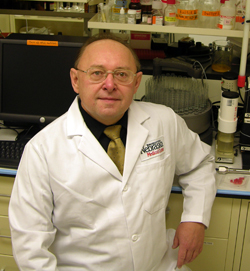 |
Sergei Vinogradov, Ph.D. |
NOTE: This profile is part of a series highlighting the 26 researchers who were named UNMC Distinguished Scientists or New Investigators for 2007. Each of these researchers will be profiled in UNMC Today leading up to a March 20 ceremony to recognize their achievements.
- Name: Sergei Vinogradov, Ph.D.
- Title: Associate professor
- Joined UNMC: 1998
- Hometown: Moscow
Briefly describe your research in laymen terms, please.
Development of nanosized drug-filled pills for therapeutic applications including treatment of brain diseases, targeting tumors and metastases and fighting viral plagues.
What led you to pursue this area of research?
I came of age in the time when genetics and especially molecular genetics became open in the ex-Soviet Union and I was extremely excited with the discoveries of gene code and by the pioneering works of Dr. Gobind Khorana on chemical synthesis of artificial genes. It turned my attention to the chemistry of biologically active nucleotides and nucleic acids. These are important blocks and biological polymers, which are laid in the beginning of each human being (after God’s spirit, of course). I am continuing to investigate potentials of these wonderful molecules in the drug-delivery area.
How do you see your research contributing to science?
Truly, I have always considered myself as a chemical engineer, a person creating new entities, new molecules and novel molecular carriers. This is the most exciting part of my work. I would prefer the term “nanoengineer.” We are in the very beginning of the long winding road leading to creation of unimaginable tiny molecular devices capable of doing repairmen’s jobs inside our body.
Why did you become a scientist?
I couldn’t do anything else. Partially, it was because of my father’s occupation as traveling geographer (I called him “Iceman” because he studied glaciers in very remote parts of the world). I have always been excited by nature’s mysteries, such as dinosaurs, cosmic phenomena and space exploration. I started early in science, building dangerous rockets and studying chemistry in state-run kid’s clubs. I participated in scientific fairs from the age of 12 and then went on to study in the chemical department at Moscow State University.
What is your hope for the next generation of scientists?
When I first arrived in the United States, I met a team of young football players on an airplane ride. They were all tall, smiling boys and this was the face of America to me. I hope scientific research will eventually become more popular here and many young American boys and girls will help the United States lead the world in science.
Beyond grant funding, how do you measure success?
For each one it’s very personal. Salary, position and recognition are very important to most of us but everyone has different levels of what he believes is a real success. My opinion is that the most important side of success is when you become independent (in many senses), you can live and work at your own pace and get appreciation from those around you and those who share your interests.
What would you tell a student interested in a research career?
To be prepared to read a lot, have a fresh and ever inquisitive mind, cold blood-resistance to failures and hot-hearted enthusiasm in pursuing your research goals. This is one of the most interesting and exciting jobs — although not as exciting as “ER” or NASCAR — but you can experience new, unexpected and sometimes very rewarding events every day in the lab. And you also will get the opportunity to communicate with your fellow scientists and realize how smart and original they are.
Do you have a hero/role model? If so, what do you admire most about them?
Joan of Arc. She was really a great person and her life always impressed me. Her life has been a mystery for 500 years and will probably remain such for another 500 years. I admire her courage, will and friendly relationships with God. Since 1994 I have viewed Mr. Warren Buffet as a role model. I am lucky to live with him in the same city.
Tell us about your family and hobbies outside of the lab.
I have three kids; my two older ones live in Moscow and have their own families. My youngest son, Sam, was born in Omaha in 1998 and is now my best pal. We travel a lot together (Papa’s genes!) and enjoy various activities such as swimming and biking together. My wife also works at UNMC and is pretty content with her busy life. This summer, I spent two weeks in France with my daughter traveling south from Paris, tasting fine wines along the road. This is one of my preferred hobbies. My last name can be translated as “wine tester.”
List three things few people know about you.
- I like reading scary novels in the night;
- I believe we are not alone in the Universe (but I hope they are not little green men); and
- I used to be a free-style wrestler in my college years. Even now I have sudden urges to go fighting (in sport sense, of course). My son is a little bit afraid of it.